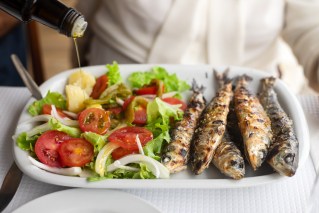‘Avoid this supermarket aisle’: Warning on popular baby food products

Parents have been urged to bypass the baby and toddler food section of the supermarket, as research reveals the scarily high sugar content of many products.
Introducing babies and toddlers – as young as four months – to sugar at that age sets a dangerous precedent for their developing tastebuds and health habits, the Australian research team said.
Research lead Alison McAleese said the team, from Cancer Council Victoria, set out to create an easy guide for parents to refer to, so they could better understand the ingredients panel on pre-packaged foods for their children.
“Where we ended up, there’s so many of these products that aren’t nutritious … just skip that aisle altogether,” Ms McAleese told The New Daily.
The findings, published in the Nutrition & Dietetics Journal recently, mirror that of research done internationally.
In July, findings out of the United Kingdom revealed almost a third of ‘sweet’ foods had concentrated juice added to up their flavours.
In the savoury category, 18 per cent of products actually contained more than half sweet vegetables or fruit.
Not a sweet start to life
Ms McAleese, an accredited practising dietitian, said the infant and toddler food aisle was a confusing place for parents.
Products beam out that they’re made of fruit and vegetables, marketing themselves as healthy and nutritious.
It’s only when an informed eye scans the label that their true contents are revealed, Ms McAleese said.
“A lot of the sugar actually comes from highly processed fruits, so things like liquid fruit paste or fruit juice concentrate, or even just fruit juice in there, but then they’ll label the product in a way that makes it look like it’s actually containing fruit so parents are probably buying this thinking, ‘Great – my kids can eat fruit’,” she explained.
“But the reality is, it’s so processed that it’s really just sugar, and often it was really high sugar content as well.”

Packaging might present a product as containing fruit, but it doesn’t always specify what sort of fruit product is inside. Photo: Getty
The danger is then it sets a taste preference for children, at such a young age.
The sweeter products taste better, therefore the children are more likely to eat it – and the parents more likely to choose that brand to buy again.
Australia, like most countries, is battling an obesity problem. That problem extends especially to our young – an estimated one in every four children and adolescents is obese.
“Increases in the availability and consumption of processed foods by children mean that we’re seeing the sharpest increase in obesity among very young children, with children aged two to five now twice as likely to be obese as they were 20 years ago,” Jane Martin, of the Obesity Policy Coalition and co-researcher of the study, wrote for Choice last year.
The solution: DIY until regulations are overhauled
Ms McAleese said it was easier – and cheaper – for parents to adapt regular foods for infant and toddler diets, than to try and wade through the pre-packaged foods aisle.
“Just buy more nutritious things that you would find in other sections in the market,” she advised.

Introducing overly sweet foods to a child’s diet early on sets their taste preferences for life. Photo: Getty
“And same with fruit and vegetables – you’re better off with something that you’ve got at home, if they’re old enough to have a piece of fruit or just puree it yourself.”
At present, there are some regulations that dictate the salt and sodium levels of products for children aged up to 12 months, but Ms McAleese says that’s lacking when it comes to sugar content.
She’d also like to see added sugars declared on packaging, to make informed shopping easier.








